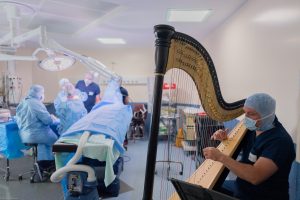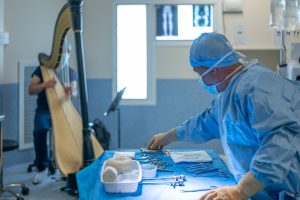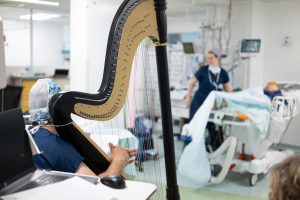Camac Blog
François Pernel: A most unusual performance…
News
August 22, 2023
François Pernel has an excellent reputation as a harpist who provides music for weddings, marriages and events, and the creation of an exceptional ambience. In this capacity, he works alongside some of the leading wedding suppliers in the business.
Any freelance harpist has to be open to possibilities. It is one of the magical but unpredictable things about being a performer. Who will hear you on this occasion, who could open the next door to opportunity? One job leads to another, and it’s how performers move from performance to performance. When François played at the marriage of Surgeon, Dr. Philippe Paillard, a chance remark led to a most unusual performance…

François Pernel performs on his Camac Égerie during a surgical procedure. Photo by BRUNO COHEN
“I met Philippe nearly two years ago because I was the harpist at his wedding. Since then, we’ve worked together on other musical events, and it was in the form of a joke, during our discussions, that I said to him: “how I’d love to be able to attend a day in the operating theatre”.
Philippe loves a challenge and he immediately responded with enthusiasm and made it possible: with the harp! The Bizet clinic approved and supervised the project.” [A wonderful name for a clinic in this context!]
The use of music and particularly harp music in a therapeutic context has gained more and more currency in recent years; there are a number of initiatives globally that show harpists how to operate within the medical sphere in non-intrusive approaches that benefit patients, families and staff alike. But few harpists have ventured into the sanctum of the surgery itself.
“The feedback I’ve had throughout the day has obviously convinced me of the benefits of using an instrument like the harp in a care setting. Hospital remains an anxiety-inducing environment, even if the teams do their best to reassure patients. As I myself am unfamiliar with this atmosphere, it took me a while to understand the logic: it’s an environment apart, out of time, with specific rules, an atmosphere ‘disconnected from the day’.”

A surgeon carefully selects his instrument as François plays. Photo by BRUNO COHEN
We asked François: Is this kind of work something which should be given more weight in modern approaches to the instrument?
“To give you a precise answer, I’m just going to quote a patient I accompanied during his day in the operating theatre, who is also a surgeon: he told me that my harp was much more powerful than any painkiller! For someone who ‘knows the business’, if I may say so, the statement gives my intervention great meaning.”
Nonetheless, many performers might feel a twinge of fear, being present in such a rarefied and physically demanding space, where people are opened up and operated on. However, François seems to have had rather a sense of sang froid, and was actively fascinated by what was taking place before him:
“I was more or less prepared. But I wasn’t exactly numb to it either! The first operation was a PTG (total knee replacement). It’s a very impressive operation. Then there was an arthroscopy: I found it hard to play because I was ‘fascinated’ by what I was seeing on the screen! I didn’t get in the way of surgical procedures either, and I was well bundled up in protective and hygiene equipment. There are very specific sounds and smells that make this world so singular.”
Many musicians and lovers of music will attest to the potency of its power to promote a sense of inner wellbeing. To quantify and qualify these effects is however a rather more mercurial question: personal, and harder to define. But it would seem that musicians are more and more welcome in these challenging contexts, where music has the possibility to positively influence a potentially frightening (even traumatic) event.
“Music is very powerful. I’ve always had the very strong feeling that the harp could ‘cleanse’ environments where people felt abandoned and left to their own devices. I was in England at a centre for people with disabilities. We played a duet with an English harpist and at the end there was a huge silence. The concert hall was ‘washed out’, so to speak, ‘rebooted’.

Harp music can help support patients while they face pain or anxiety. Photo by BRUNO COHEN
On the other hand, as I’m very (overly) sensitive, I’ll sometimes leave a place if the music being played or broadcast there touches low energies. That’s just how I feel. Yes, there is music that lifts the spirit and soothes, and other music that makes us resonate with anger, violence and estrangement.
I think the harpists reading this article have already experienced these moments […] there are those moments when the harp is just a vector, a tool to transform the moment, the people, the place.
I believe in the omnipotence of music when you step outside your ego. By this I mean: when the performer is simply a go-between, and his or her instrument is merely a pretext for communicating with the Other, regardless of the score.”

I worked as a music therapist in a hospital in Japan for 10 years. And now I work as a music therapist in a state hospital in Australia. This is what I want to do and this is my goal. I think it is a wonderful thing. To do this, you need the understanding of many health professionals. How did you convince them, can you tell us for the future? I am very interested.
wonderful! I am a theatre surgical nurse for many years, and now I play the harp. I am on my path to starting harp therapy, as I know how great it is for patients in medical facilities feel. I have twice had the opportunity to play in foyer of major hospital, and the amount of people that comment positively, shows it really touches people playing the harp.